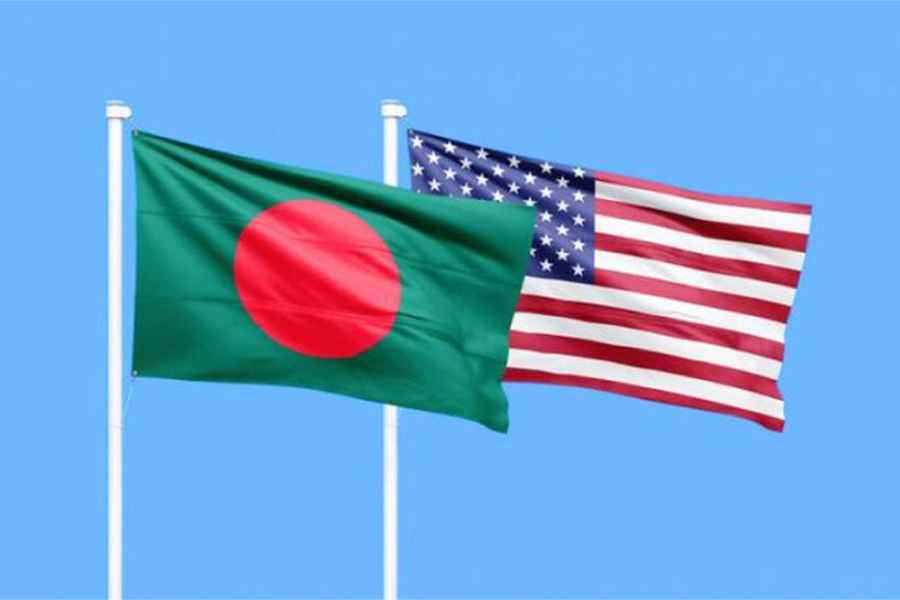
Published :
Updated :

Industry leaders in the Readymade Garment (RMG) sector should have been elated by the fact that in the last financial year (FY2024-25), export of their products to the USA registered a sharp rise by 14 per cent compared to the previous fiscal (FY24). But at the moment, they may not be in the mood to rejoice at the latest development. The reason is, the tariff talks with the USA, the single biggest market for Bangladeshi woven garment products, have not produced any positive results so far. Notably, the Trump administration, in addition to the existing 15 per cent, has imposed another 35 per cent as reciprocal tariff on Bangladesh's exports to the USA. Now it is also demanding a 40 per cent local value addition to our RMG products to qualify for 'Made-in-Bangladesh' label. But this condition, if not relaxed, is going to deal a heavy blow to the woven garment's export to the US market. Bangladesh's trade delegation in Washington, D.C. has been holding negotiations with the Office of the US Trade Representative (USTR) seeking relaxation of the Rules of Origin (RoO) requirement related to the condition of 40 per cent local value addition. The problem with this particular requirement is that 70 per cent of the fabric for the woven sector is imported from China. Obviously, that is a big issue for Washington, as it is at the moment in a trade war with China. The Trump administration's policy is to reduce global value chain's reliance on Chinese raw materials. According to the Export Promotion Bureau (EPB), in the fiscal year 2024-25, Bangladesh exported RMG products worth USD7.54 billion to the US market. It marked a substantial volume of apparel goods shipment to that country. So, it is not hard to understand the challenge Bangladesh is now faced with. And of that US bound apparel goods, woven garment was the dominant component. To reduce Bangladesh's dependence on China-origin fabric for its woven sector, domestic capacity is required to be developed for meeting the US's condition of local value addition. Since developing the necessary backward linkages to produce the fabric (for woven garment) domestically, Bangladesh would be hard put to meet USTR's RoO requirements. Since Bangladesh-US tariff talks have also their geopolitical dimensions, the team conducting the negotiations led by commerce adviser Sk Bashiruddin may require additional diplomatic support.
It is worthwhile to note here that according to a Bloomberg report, India, which is also holding tariff talks with the USA might win a below 20 per cent reduction in the proposed tariff, which will be lower than what Vietnam has secured (20 per cent tariff) from the USA. In that case, Bangladesh risks losing its competitive edge vis-a-vis its regional competitors.
Unless the tariff is reduced, or the RoO is relaxed, the high US tariffs on Bangladesh-origin RMG products will make those very expensive leading US retailers to look for alternative sources like India or Pakistan whose products would be cheaper due lower rate of US tariff imposed on them. According to industry insiders, some importers of our RMG products in the USA, have already put their purchase orders on hold. Suppliers to the Walmart, too, are learnt to have suspended some orders from Bangladeshi manufacturers. These are definitely not a good omen for Bangladesh's exports to the US market. Meanwhile, some quarters including the international media have been portraying a bleak future for Bangladesh's RMG sector. There are also reports of how the garment workers are now in fear of losing their jobs.
No doubt US market is important for Bangladesh. But that is not the end of the world.
In the circumstances, Bangladesh should continue its tariff negotiations with the USA. At the same time, the search should be on to look for alternative markets for Bangladesh's RMG exports. It is also time the country intensified its efforts to further widen and diversify its export basket.
sfalim.ds@gmail.com


 For all latest news, follow The Financial Express Google News channel.
For all latest news, follow The Financial Express Google News channel.